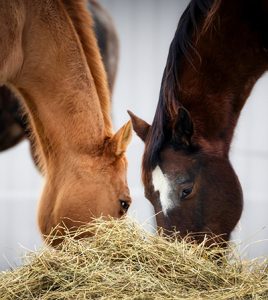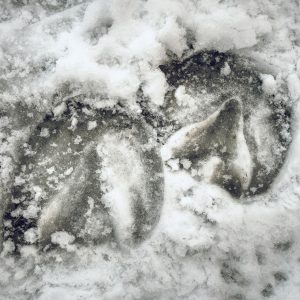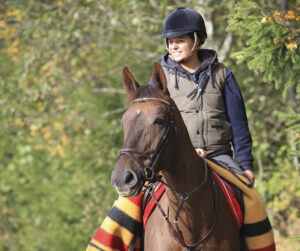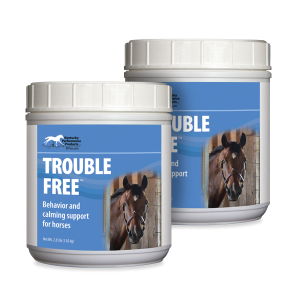
Why Do Horses Get Frisky in Cold Weather?
With cold weather underway in different parts of the country, many horse owners report a familiar phenomenon during the winter. Their horses get frisky—becoming more energetic, excitable, and even a bit unpredictable. While it can be fun to watch your horse gallop and play, frisky behavior isn’t helpful in the training or competition ring—and it can pose a safety risk.
So why do horses seem to get frisky when temperatures drop? And how can you mitigate the performance and handling problems that can come with that extra energy?
It Might Not Be About the Weather
 A change in atmosphere and environment—such as a weather system that brings wet, windy, or snowy weather—might prompt a horse to be more alert or quick to employ their flight response. Genetics and personality play a role, too: just like people, some horses do occasionally seem to enjoy romping and playing in new snow.
A change in atmosphere and environment—such as a weather system that brings wet, windy, or snowy weather—might prompt a horse to be more alert or quick to employ their flight response. Genetics and personality play a role, too: just like people, some horses do occasionally seem to enjoy romping and playing in new snow.
But research has shown that, in general, horses tend to slow down, rather than speed up, once winter cold sets in. In cold temperatures, horses often adopt behaviors that save their energy and promote warmth, such as seeking shelter, standing close together, and reducing their overall activity. Some breeds, like Shetland ponies, have been found to slow their metabolisms in winter, including reducing their heart rate and subcutaneous temperature, in another energy-conservation strategy.
Healthy horses who are domesticated and managed by humans don’t gallop around to keep warm; they typically are able to stay warm in winter cold simply through access to shelter, blankets if needed, and ample water and food—especially high-quality forage, because digesting good hay is a critical way they maintain their body temperature. (Thin, aged, or recovering horses who find it difficult to maintain their weight through the winter also can benefit from a high-fat supplement like Equi-Jewel.)
Management Factors That Add “Spice”
Feeding Simple Carbohydrates
During winter, many horse owners provide additional grain to meet their horses’ higher demand for calories to stay warm. While this can help maintain body weight, diets that are high in simple carbohydrates like grain and molasses can create a “sugar rush”—hormone fluctuations that promote excitability or even anxiety in some horses and can even contribute to colic, gastric ulcers, or laminitis.
Reduced Turnout or Training
Winter weather often brings restrictions on turnout or training time due to ice, snow, or muddy conditions. Especially for horses who are used to a lot of time outside, longer confinement can lead to pent-up energy that can put them on their toes or make them act out, either from frustration at being kept in or from excitement when they’re finally taken out again.
A diet that’s high in concentrates, rather than forage, and the potential stress of extended time without exercise also can put a horse at risk of gastrointestinal issues, including gastric ulcers.
Vitamin or Mineral Deficiency
Research has shown that horses who are deficient in the mineral magnesium or who have inadequate levels of essential B vitamins like thiamine—which horses typically get from fresh forage like green pasture grass—can appear nervous. Horses whose grazing is interrupted for an extended time, who lack regular access to high-quality hay, or whose thiamine requirements have increased due to stress might show increased irritability or sensitivity.
Managing Frisky Behavior
When horses get frisky, to offset management factors that may contribute to this behavior, try the following recommendations:
Maintain Exercise
 Turnout even in cold or snowy conditions is important, provided your horse has access to an area that’s ice-free. Empty indoor arenas also can make good equine playgrounds when footing or weather conditions outside prevent outdoor turnout. Just be sure to remove mounting blocks, jumps, or other obstacles that could present a safety hazard to a horse with a playful case of the “zoomies.”
Turnout even in cold or snowy conditions is important, provided your horse has access to an area that’s ice-free. Empty indoor arenas also can make good equine playgrounds when footing or weather conditions outside prevent outdoor turnout. Just be sure to remove mounting blocks, jumps, or other obstacles that could present a safety hazard to a horse with a playful case of the “zoomies.”
Even if you can’t complete your full workout routine, a long walk can still allow your horse to enjoy low-impact exercise. This benefits their body and mind.
Engage and Socialize
If you’re not able to ride, look for ways to engage with your horse. It’s also helpful to let them spend time with other horses. Ground work, trick training, and even group hand-walking or grooming sessions with other horses and their owners can mentally stimulate your horse. This will help prevent boredom, and allow them to socialize with other horses and humans, too.
Feed a “Cool” Diet
If you think your horse needs to eat more to stay warm in the winter, first increase his forage intake. This can include hay, hay cubes or hay pellets. Fiber is digested in the hindgut. This is where the fermentation process generates a lot of heat and provides a consistent energy source. Additionally, super fibers like molasses-free beet pulp can provide energy without spicing up your horse’s behavior. You may also want to moderate energy-dense feeds like grain concentrates. Instead, try “cool” fats like stabilized rice bran. These are digested slowly and don’t cause the hormone spikes associated with excitability. Fats contain more energy pound for pound than simple carbs. So, you can feed smaller meals and deliver just as many calories, if not more.
Consider a Calming Supplement

Horses inclined to be fresh when training or turnout is interrupted can benefit from a calming supplement. Ones that are prone to excitability, lack of focus, or spookiness may too. Trouble Free’s ingredients include magnesium and thiamine (vitamin B1). The paste or powder is formulated to support a healthy nervous system function that can help a horse maintain a calm and confident manner.
Winter doesn’t have to mean dealing with an out-of-control horse. Understand the reasons behind your horse’s increased energy and implement appropriate management strategies. That way, you can safely enjoy your horse throughout the colder months and keep them happy and focused, too.
SPONSOR: Whether fed daily or as needed during stressful situations, Trouble Free™ is scientifically formulated to support normal nerve function. This helps them to maintain calmness and focus on performance—so you can enjoy your partnership. Available in powder or paste. Learn more here.


